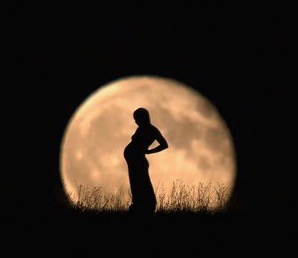The moon has long served humanity as a symbol of the inner life, romantic love, and for the heart’s feelings generally.
More prosaically, the moon has served as a tool for navigation, agriculture, oracular prediction, and religious ritual.
Perhaps it won’t come as a surprise to learn that science has begun to look at the effects that the moon may have on our health.
The following is a brief review of some very interesting studies on the ways the moon can affect our well-being:
The full moon and insanity. The term “lunatic” stems from the ages-old belief that mental and emotional disturbances increase at the time of the full moon.
There’s now persuasive evidence to support this timeless idea.
A Dutch study of more than 5,400 hospital records found that the full moon brought a marked increase in emergency admissions for psychiatric patients.
The researchers theorized that the moon’s gravity might affect the patients’ mood and behavior, by influencing the movement of liquids in the brain.
Curious fact: in 18th-century England, people on trial for murder were able to campaign for a lighter sentence on grounds of lunacy, if the crime was committed under a full moon.
 The moon and female fertility. Many early cultures believed that the moon affected the time of the month when women could most easily become pregnant – perhaps because the menstrual and lunar cycles are similar in length.
The moon and female fertility. Many early cultures believed that the moon affected the time of the month when women could most easily become pregnant – perhaps because the menstrual and lunar cycles are similar in length.
A study reported in the journal Acta Obstetricia et Gynecologica Scandinavica tracked more than 800 women for as long as 25 years. The researchers found that nearly 30 percent of the women had their periods in the days immediately surrounding the full moon.
A study of more than 8,000 women, presented at the annual conference of the American Society for Reproductive Medicine, found that most women’s periods began within the two weeks starting 11 days before the beginning of the full moon.
Other studies have found that women are most fertile at the time of the new moon, when the sky is darkest.
The moon and sleep. A study at the University of Basel, Switzerland, published in Current Biology, found that it took people longer to fall asleep at the time of the full moon.
When the moon was full, the rate of brain activity that indicates a deep, restful sleep dropped by 30 percent, and people slept 20 minutes less during the same period.
Tests also found a reduction in the hormone melatonin during the full moon. Melatonin helps normalize the cycles of sleep and waking.
The moon and heart attacks. A German study reported in the European Journal of Preventive Cardiology examined the records of 16,000 heart-attack victims. The researchers found a significant reduction in attacks in the three days after the new moon. The authors theorized that the moon has a beneficial effect on the heart twice a month – during the full moon and during a new moon, when the sun and moon are aligned and gravity is at its strongest.
The moon and kidney stones. A study of approximately 1,500 people, published in Urology, found that kidney-stone pain increased significantly during the full moon.
Although other studies haven’t confirmed the finding, a study at the Royal Liverpool University Hospital found that the number of patients admitted for urological emergencies increased during the full moon.
The moon and surgical outcomes. A 2013 study, reported in Interactive Cardiovascular and Thoracic Surgery, found that patients who underwent one form of emergency open heart surgery at the time of the full moon were hospitalized for four fewer days on average (10 days versus 14) than patients whose surgery occurred during other lunar phases.
The human mind is hard-pressed to embrace the enormous influence of the moon. While it’s fine to study the moon’s effects in the lab, let’s not forget to savor the serenity of the full moon with our hearts and souls. A barefoot walk in a grassy meadow will suffice, inviting us to absorb the rays of the same moon that inspired Omar Khayyam, Cleopatra, Shakespeare, Lincoln, Galileo, and Washington.
Ming-Dao Deng writes in his lovely book, Everyday Tao: Living with Balance and Harmony:
“The moon does not fight. It attacks no one. It does not worry. It does not try to crush others. It keeps to its course, but by its very nature, it gently influences. What other body could pull an entire ocean from shore to shore? The moon is faithful to its nature and its power is never diminished.”
To learn more about Dr. Marcel’s work, follow this link.

